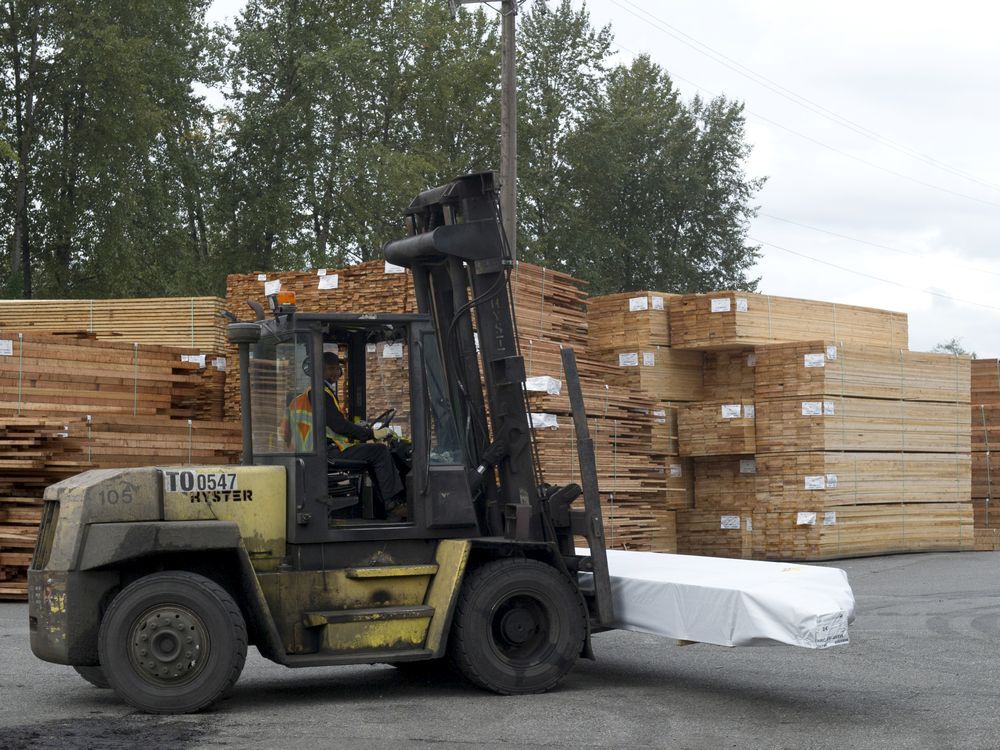Vaughn Palmer: Teal-Jones is investing in Virginia because it can make money there, and not here

Credit to Author: Stephen Snelgrove| Date: Tue, 01 Oct 2019 00:48:37 +0000
VICTORIA — Amid a mostly upbeat speech to local government leaders last week, B.C. Premier John Horgan voiced frustration about a recent meeting with the major forest companies.
“I sat down with the five major CEOs of forest companies in B.C. and we had a candid discussion,” Horgan confided to the delegates Friday. “But it is hard for me to listen to companies say they’re in distress when they’re making multimillion-dollar investments in the U.S. and Europe, and around the world.”
Horgan insisted he’d like forest firms to do well here as well. “I want them to be successful,” the premier continued. “I want them to be profitable.”
But: “What we’ve been doing over the past number of months is encouraging the forest industry to transform to the markets of the future … and that means focusing on getting more money out of our forests, not more wood out of our forests.
“For too long we have been sending our logs offshore without adding any value. For too long we’ve been focusing on high volume and not on high value.”
Horgan isn’t the first B.C. premier to talk about adding value to forest products. It has been a persistent theme for decades.
The current NDP premier is staking his initial hopes on a government-led drive to make greater use of wood in construction, especially public buildings and highrises of up to 12 storeys. Those projects will draw heavily on innovative new forest products, including strengthened structural components and glue-laminated beams and panels — known collectively as mass timber.
B.C. Premier John Horgan is urging lumber companies to invest more heavily in value-added wood products such as mass timber, which was used in the award-winning West Wing at Penticton Lakeside Resort, designed by Vancouver-based HDR architects.
“Some of the fastest-growing communities in our province are committed to accepting the building-code changes and getting cross-laminated timber projects up and running as fast as we possibly can,” said Horgan. “It creates jobs, sustainable building material, good all the way around, and I think that’s the type of success we want to see.”
He singled out Kalesnikoff Lumber, a family-owned business based in Thrums near Castlegar, for “seeing the writing on the wall.”
The company is spending $35 million on a state-of-the-art mass timber manufacturing plant that will employ 50 when fully up and running next year. Good news, surely. But Horgan used it to take another swipe at forest companies who’ve not been lining up to invest in B.C.
“Kalesnikoff Lumber sees the opportunity and that’s why they’re investing not in Virginia, not in Alabama, not in Sweden, but in the Kootenays.”
The premier’s specific reference to the U.S. state of Virginia was readily explained by the previous day’s news out of the office of Virginia Gov. Ralph Northam.
“British Columbia-based Teal-Jones Group is investing a total of $31.75 million to expand sawmill and dry-kiln operations at two recently acquired lumber mills in Virginia,” said the news release.
The twin investments would create 126 jobs in the state — or “the commonwealth” as Virginians prefer. The company also committed to buying $100 million worth of timber over four years. In return, Virginia put up half-a-million dollars in grants to assist local governments to bring the projects along.
“This major investment is evidence of the world-class workforce, critical infrastructure and abundant natural resources that make our commonwealth the best place for business,” said Northam. “We are thrilled to see this momentum continue with Teal-Jones Group’s decision. Together, these projects will bring new jobs and economic vitality to our rural communities and help create the markets needed for sustainable forest management.”
Which is the sort of thing Horgan would have said if the company were investing the equivalent of $40 million Cdn to create 126 jobs in B.C.
But the news out of Virginia came just two weeks after Teal-Jones announced a major curtailment of its operations in B.C. The immediate impact was loss of 300 contract logging jobs on Vancouver Island. Another 800 layoffs would follow once inventories were exhausted at mills on the mainland.
The company put some of the blame on policy changes under the Horgan government, challenging the NDP line of defence that it’s all the fault of depressed markets and neglect by the previous B.C. Liberal government.
“Teal-Jones economics have been further negatively impacted by high stumpage rates and higher harvesting costs on the B.C. coast. Current stumpage rates remain high relative to lumber prices, and harvesting costs have been adversely impacted by new regulations to bring out more residual waste fibre. These negative factors have made it impossible for the company to continue operating its forest licences economically.”
That was the word out of the company Sept. 11. On the 25th, the same day as a parade of logging trucks staged a protest in Downtown Vancouver, Teal-Jones CEO Dick Jones announced the expanded commitment to operations in Virginia.
“We plan on putting down deep roots here in Virginia,” said Jones in the process of thanking the governor and local officials, “for welcoming us with open arms and making us feel at home. Every step of the way, they have been looking for ways to help us build a stronger foundation for our mills and employees.”
In short, Teal-Jones is reducing operations in B.C. because it can’t make money here. It’s investing in Virginia because it can make money there.
Horgan may find that news “hard” to take. But there’s a message there for him and his government, if only they would listen.
CLICK HERE to report a typo.
Is there more to this story? We’d like to hear from you about this or any other stories you think we should know about. Email vantips@postmedia.com.